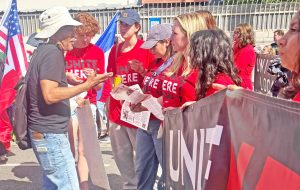
LOS ANGELES, USA, October 4—Comrades and new participants in the US and El Salvador gathered for a lively and politically rich Zoom forum on “Immigration and Social Media.” The discussion focused on how immigration policies and US foreign interventions are shaping the conditions for an impending World War III and how workers can use social media to resist repression and organize across borders.
The initiative and collective preparation of the three comrades who led it reflect the growing leadership of the Party’s newer generation. Their opening remarks tied immigrants’ struggles to imperialism and the capitalist system that drives global conflict.
“We were able to get through most of our agenda,” said one. “Several examples helped clarify the main contradictions between the working class and the capitalist state. Using technology for interpretation made the forum more accessible.”
Another agreed that the discussion went well but noted the limits of time: “We didn’t get through Question 3. Zoom makes it difficult for the interpreter to also participate, and that created some confusion.”
At first, not all participants were eager to share. Many listened closely to the opening presentations. As the discussion deepened, more participants began contributing. They linked firsthand experiences and political ideas to the larger question of how capitalism uses both war and borders to divide the working class.
A third organizer reflected, “It was frustrating for some voices not to be heard, but we still managed to hold a solid discussion with good political energy.”
Several new participants joined, including a young worker whom we met at a recent rally against ICE. Their presence highlighted how the struggle in the streets can be connected to political education and organizing discussions.
A husband-and-wife team who have been part of immigration patrols also participated. He noted that we need to reach out to other groups and get organized with them to get bigger and stronger.
One opportunity is to join with others to patrol vulnerable communities including adopting a school. While patrolling, let the community know who we are and recruit. Many organizations are already doing this, but the community needs more support.
An ex-garment worker comrade emphasized the importance of distributing Red Flag. He and others used to distribute hundreds of papers at garment factories. We need to do it more to bring more people to the party.
Comrade N noted that not enough people were called on to speak and that some chat questions went unanswered. “We didn’t get to know everyone in the room,” they said.
Comrade J took responsibility for that: “As a teacher, I should have had more confidence calling on people. I hesitated because I didn’t want to dominate, but I’ll do better next time.”
The collective mood was hopeful and self-critical in the best sense. Every event is a chance to sharpen our skills as organizers, interpreters, and facilitators. “We’re learning to balance technology, language, and participation all at once,” said one comrade. “Those are good problems to have.”
The forum also demonstrated the Party’s growing ability to connect local struggle with global vision. The bilingual format and the internationalist spirit embodied the principle that the working class has no borders.
As a comrade noted, “The most important thing was seeing younger comrades step up with confidence and humility. They’re taking leadership seriously and showing what collective responsibility looks like.”
Read our pamphlet: Fight For the Day When No Worker Will be Called Foreigner here

